小升初专项复习——动词(共23张PPT)
文档属性
| 名称 | 小升初专项复习——动词(共23张PPT) | 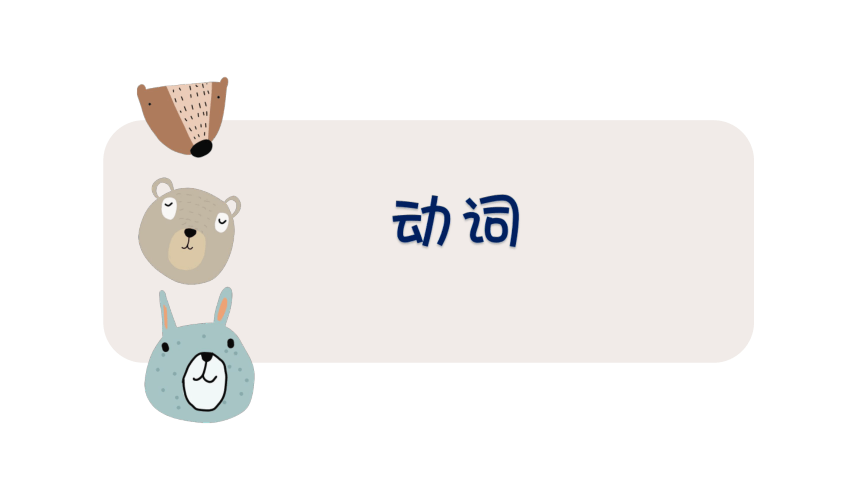 | |
| 格式 | zip | ||
| 文件大小 | 20.1MB | ||
| 资源类型 | 教案 | ||
| 版本资源 | 通用版 | ||
| 科目 | 英语 | ||
| 更新时间 | 2020-06-07 00:23:16 | ||
图片预览

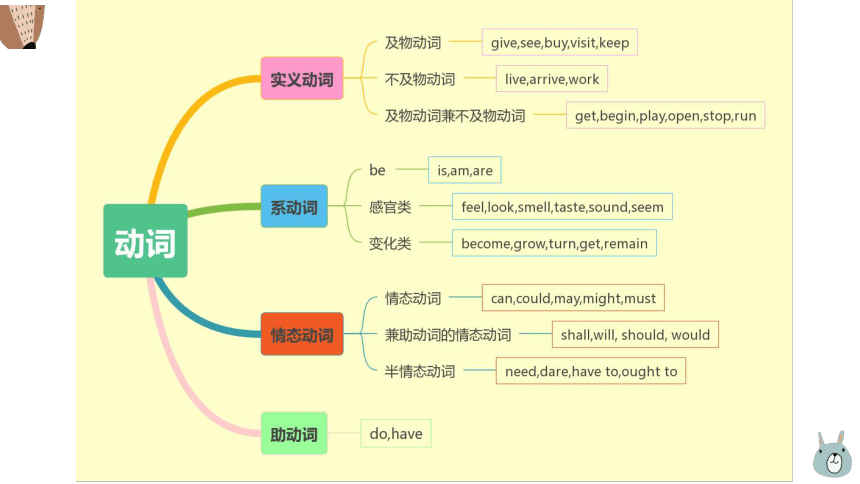
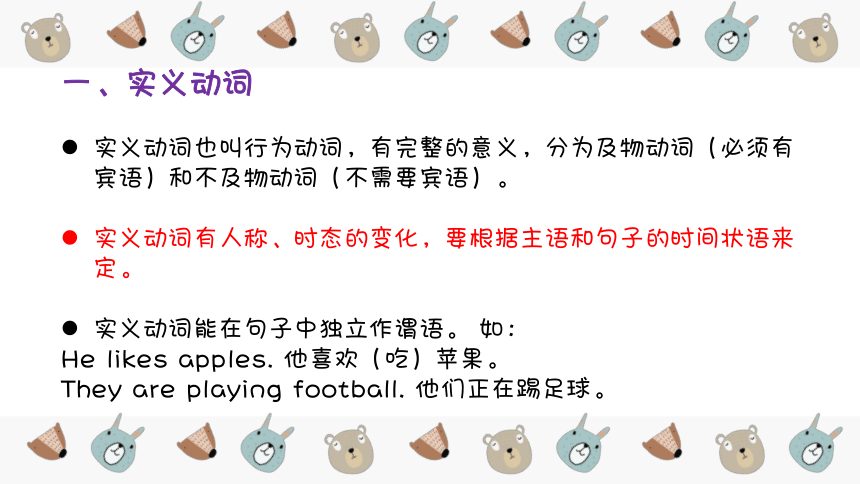
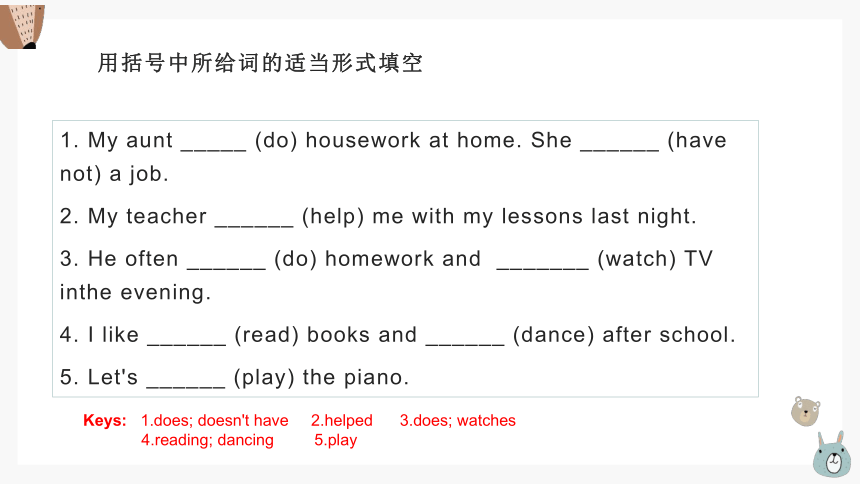
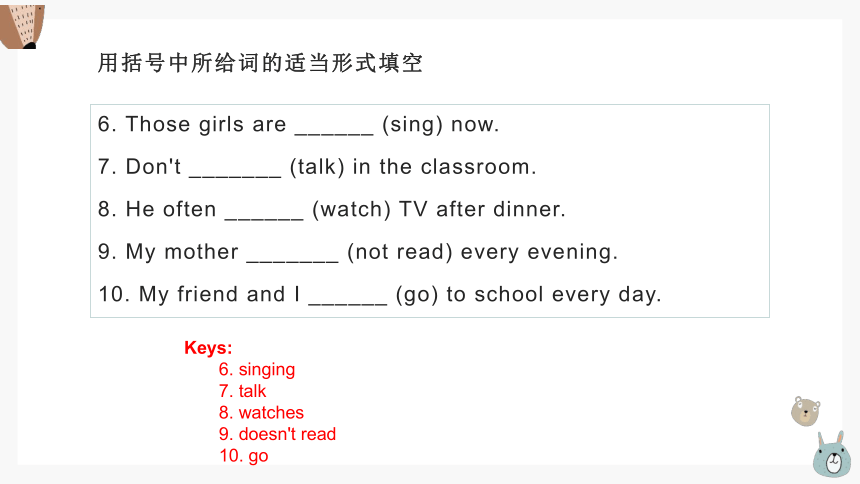
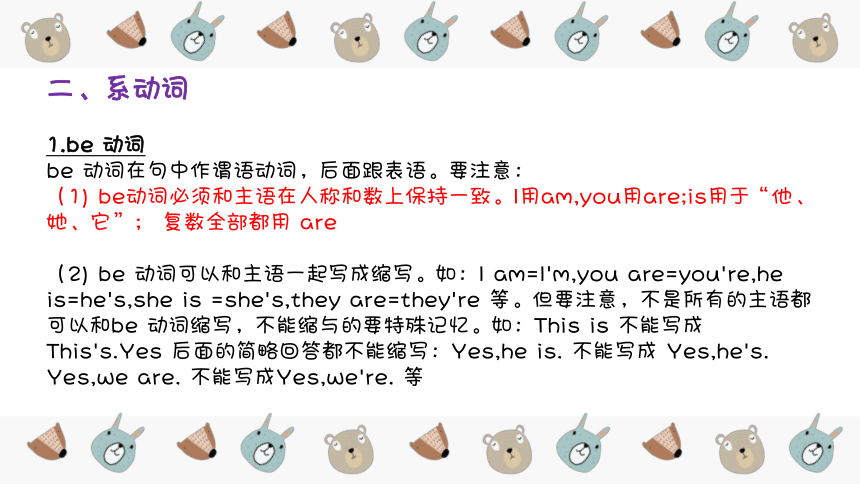
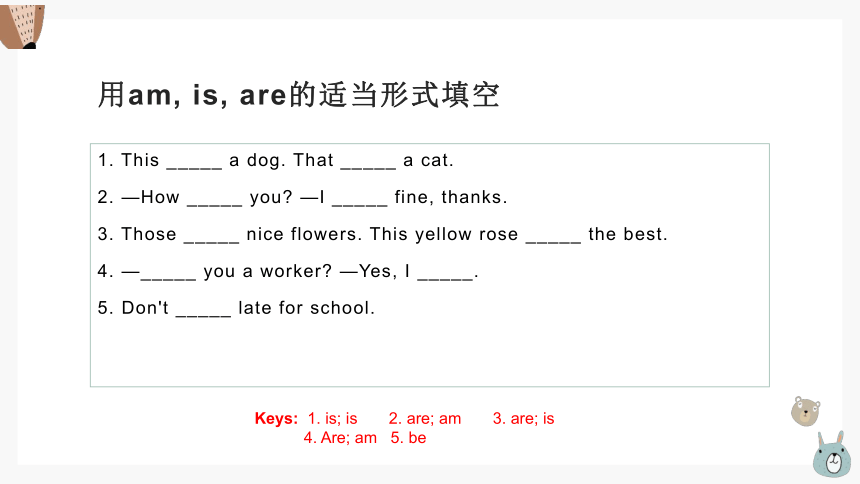

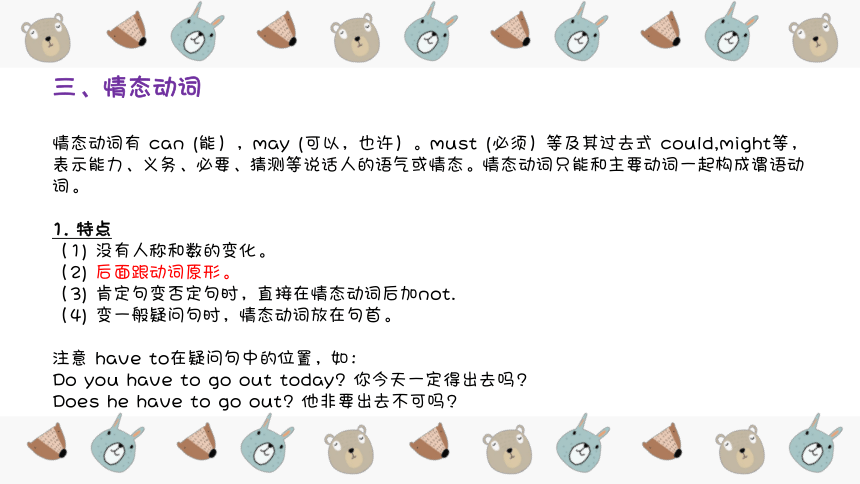
文档简介
(共23张PPT)
动词
一、实义动词
实义动词也叫行为动词,有完整的意义,分为及物动词(必须有宾语)和不及物动词(不需要宾语)。
实义动词有人称、时态的变化,要根据主语和句子的时间状语来定。
实义动词能在句子中独立作谓语。
如:
He
likes
apples.
他喜欢(吃)苹果。
They
are
playing
football.
他们正在踢足球。
用括号中所给词的适当形式填空
1.
My
aunt
_____
(do)
housework
at
home.
She
______
(have
not)
a
job.
2.
My
teacher
______
(help)
me
with
my
lessons
last
night.
3.
He
often
______
(do)
homework
and
_______
(watch)
TV
inthe
evening.
4.
I
like
______
(read)
books
and
______
(dance)
after
school.
5.
Let's
______
(play)
the
piano.
Keys:
1.does;
doesn't
have
2.helped
3.does;
watches
4.reading;
dancing
5.play
6.
Those
girls
are
______
(sing)
now.
7.
Don't
_______
(talk)
in
the
classroom.
8.
He
often
______
(watch)
TV
after
dinner.
9.
My
mother
_______
(not
read)
every
evening.
10.
My
friend
and
I
______
(go)
to
school
every
day.
用括号中所给词的适当形式填空
Keys:
6.
singing
7.
talk
8.
watches
9.
doesn't
read
10.
go
二、系动词
1.be
动词
be
动词在句中作谓语动词,后面跟表语。要注意:
(1)
be动词必须和主语在人称和数上保持一致。I用am,you用are;is用于“他、她、它”;
复数全部都用
are
(2)
be
动词可以和主语一起写成缩写。如:I
am=I'm,you
are=you're,he
is=he's,she
is
=she's,they
are=they're
等。但要注意,不是所有的主语都可以和be
动词缩写,不能缩与的要特殊记忆。如:This
is
不能写成This's.Yes
后面的简略回答都不能缩写:Yes,he
is.
不能写成
Yes,he's.
Yes,we
are.
不能写成Yes,we're.
等
用am,
is,
are的适当形式填空
1.
This
_____
a
dog.
That
_____
a
cat.
2.
—How
_____
you?
—I
_____
fine,
thanks.
3.
Those
_____
nice
flowers.
This
yellow
rose
_____
the
best.
4.
—_____
you
a
worker?
—Yes,
I
_____.
5.
Don't
_____
late
for
school.
Keys:
1.
is;
is
2.
are;
am
3.
are;
is
4.
Are;
am
5.
be
2.
小学阶段其他常见系动词
小学英语中的系动词有be
(是),seem
(似乎),smell
(闻起来),taste
(尝起来),sound
(听起来),look
(看起来),keep
(保持),become
(变成),get
(变得),grow
(变得),feel
(感到),tumn
(变得,变成),appear
(显得),remain
(仍旧是)等。要注意:
(1)
系动词一般不用于现在进行时。如:He
feels
sad.
他感到伤心。
(2)
系动词不能用副词修饰,其后跟形容词作表语。如:
The
baby
is
sleeping.
Please
keep
quiet.
宝宝正在睡觉,请保持安静。
三、情态动词
情态动词有
can
(能),may
(可以,也许)。must
(必须)等及其过去式
could,might等,表示能力、义务、必要、猜测等说话人的语气或情态。情态动词只能和主要动词一起构成谓语动词。
1.
特点
(1)
没有人称和数的变化。
(2)
后面跟动词原形。
(3)
肯定句变否定句时,直接在情态动词后加not.
(4)
变一般疑问句时,情态动词放在句首。
注意
have
to在疑问句中的位置,如:
Do
you
have
to
go
out
today?
你今天一定得出去吗?
Does
he
have
to
go
out?
他非要出去不可吗?
2.
否定式
情态动词和助动词一样,后面可直接跟否定词not.现将情态动词的否定式及其否定式的简略式(常用于口语中)列举如下:
shall
not-shan't
will
not-won't
can
not-can't
must
not-mustn't
should
not-shouldn't
would
not-wouldn't
could
not-couldn't
dare
not-daren't
need
not-needn't
3.can
的用法
(1)
表示能力、功能,常意为“能,会”。如:
I
can
play
the
piano.
我会弹钢琴。
John
can
drive
now.
约翰现在会开车了。
(2)
表示可能性,常意为“可能,可能会”。如:
I
think
the
work
can
be
completed
ahead
of
time.
我认为这项工作能提前完成。
(3)
表示允许、请求,常意为“可以”。如:
You
can't
take
the
book
out
of
the
room.
你不可以将这本书拿出室外。
Can
I
use
your
pen?
我可以用一下你的笔吗?
4.must
的用法
(1)
表示必要、命令或强制的语气,常意为“必须,得”。如:
You
mustn't
talk
here.
你不能在这里说话。
You
must
do
like
this.
你必须像这样做。
We
must
be
home
by
seven.
我们必须在七点以前到家。
(2)
表示肯定的推测,常意为“一定是,想必”。如:
This
must
be
your
room.
这一定是你的房间了。
5.may的用法
(1)
表示可能性,意为“可能,也许”。如:
She
may
be
a
teacher.
她可能是位教师。
(2)
表示许可或请求许可,常意为“可以”。如:
May
I
come
in?
我可以进来吗?
6.may,can,must和
should
的区别
这四个词语的区别常常体现在语气上。may
表示“可以”,
它的语气最委婉,最有礼貌,通常请求时都用到may.如:May
I
borrow
your
ruler?
我能借一下你的尺子吗?can表示“能,会”,
通常用来表示某人的能力,也可以用在请求的句子里,但语气没有may
委婉。如:Can
I
have
some
noodles?
我能吃点面条吗?must
表示“必须”,
通常用在命令的语气里。如:Youmust
clean
your
bedroom
first.
你必须先打扫卧室。should
表示“得,要,应该”,
感彩不强烈,通常用于询问对方自己接下来该干什么。
用适当的情态动词填空
1.
—______
I
play
computer
games,
mum?
—No,
you
mustn't.
2.
Sorry,
I
______
do
this
Maths
problem.
3.
You
_______
not
copy
others'
homework.
4.
Lily
______
sing
very
well.
5.
What
______
I
do
then?
Keys:
1.
May
语气委婉的请求
2.
can't
Sorry可判断没有做某事的能力
3.
must
禁止抄袭,语气强烈
4.
can
表示能力
5.
should
询问别人自己接下来该做什么
四、助动词
助动词有
shall,will,have,should,would,do等。它们只能和主要动词一起构成各种时态、语态和语气等,以及构成否定和疑问等结构中的谓语动词。如:
Shall
we
go
there
by
train?
我们坐火车去那儿吗?
Do
be
careful!
务必小心!
do
和
have
也可以作实义动词。如:
do
homework
做作业
I
have
a
ball.
我有一个皮球。
Exercise
一、单项选择
(
)1.
Five
people
_____
walking
on
the
road.
A.am
B.is
C.
are
(
)2.
______
my
best
friend,
Lily.
A.This's
B.This
is
C.This
are
(
)3.
These
_____
not
my
pencils.
They
_____
theirs.
A.am;are
B.is;are
C.are;are
(
)4.
Lucy
and
I
_____
in
Class
2.
A.am
B.is
C.are
(
)5.
—_____
you
a
doctor?
—No,
I
_____.
A.Are;aren't
B.Is;amn't
C.Are;am
not
Keys:
1.C
2.B
3.C
4.C
5.C
Exercise
(
)6.
I
can
_____
it
and
Sam
can
______
it,
too.
A.see;
see
B.
see;
sees
C.look;
looks
(
)7.
—_____
I
have
an
apple?
—
Yes,
of
course.
A.Should
B.Can
C.Must
(
)8.
We
shouldn't
_____
the
animals
in
the
zoo.
This
is
the
rule.
A.feeds
B.feeding
C.feed
(
)9.
—Can
you
sing
a
song
in
English?
—
No,
I
______.
A.may
not
B.
can't
C.
mustn't
(
)10.
The
doctor
tells
him
______
more
exercise.
A.
to
take
B.take
C.
taking
Keys:
6.A
7.B
8.C
9.B
10.A
Exercise
Keys:
1.A
2.C
3.B
4.D
5.D
二、选出与其他不是同类的一项
(
)1.
A.
come
B.
apple
C.banana
D.
orange
(
)2.
A.go
B.
come
C.
must
D.
eat
(
)3.
A.
can
B.
like
C.
may
D.
must
(
)4.
A.
is
B.
are
C.
am
D.
get
(
)5.
A.do
B.
want
C.
drive
D.
bee
Exercise
三、从方框中选择恰当的词,构成合适的动词短语
read
buy
pick
climb
take
watch
eat
go
play
learn
1.
_____
a
book
2.
_____
gifts
3.
_____
photos
4.
_____
noodles
5.
_____
flowers
6.
_____
mountains
7.
_____
shopping
8.
_____
English
9.
_____
TV
10.
_____
football
Keys:
1.
read
2.
buy
3.
take
4.
eat
5.
pick
6.
climb
7.
go
8.
learn
9.
watch
10.
play
Exercise
四、圈出下列句子中的错误,并在横线上改正
1.
My
sister
can
plays
the
guitar.
___________________
2.
Good
boy,
you
can
going
home
now.
________________
3.
—
May
I
play
computer
games
now,
mom?
—
No,
you
may
not.
______________
4.
They
aren't
can
speak
English.
_________________
5.
She
can
sings
very
well.
_______________
Keys:
1.
plays→play
2.
going→go
3.
may
not→mustn't
4.
aren't
can→can't
5.
sings→sing
Exercise
五、阅读短文,回答问题
Wang
Gang
is
12
years
old.
He
is
tall
and
strong.
He
has
big
eyes
and
big
ears.
But
his
mouth
is
small.
He
is
cool.
He
can
draw
and
play
the
violin.
He
likes
playing
football
and
swimming.
He
likes
blue
best.
His
favourite
animal
is
dog.
He
is
a
good
student.
He's
good
at
Maths
and
English.
He
speaks
English
well.
The
teachers
and
students
all
like
him
very
much.
He
is
a
happy
boy.
I
like
him,too.
We
often
study
and
play
together.
Exercise
1.
Does
Wang
Gang
have
big
eyes?
________________________________
2.
What
colour
does
Wang
Gang
like
best?
_________________________________
3.
What
can
Wang
Gang
do?
_________________________________
4.
What
animal
does
Wang
Gang
like
best?
_________________________________
5.
Does
Wang
Gang
speak
English
well?
_________________________________
Keys:
1.
Yes,
he
does.
2.
Blue.
3.
He
can
draw
and
play
the
violin.
4.
Dogs.
5.
Yes,
he
does.
Thank
you!
动词
一、实义动词
实义动词也叫行为动词,有完整的意义,分为及物动词(必须有宾语)和不及物动词(不需要宾语)。
实义动词有人称、时态的变化,要根据主语和句子的时间状语来定。
实义动词能在句子中独立作谓语。
如:
He
likes
apples.
他喜欢(吃)苹果。
They
are
playing
football.
他们正在踢足球。
用括号中所给词的适当形式填空
1.
My
aunt
_____
(do)
housework
at
home.
She
______
(have
not)
a
job.
2.
My
teacher
______
(help)
me
with
my
lessons
last
night.
3.
He
often
______
(do)
homework
and
_______
(watch)
TV
inthe
evening.
4.
I
like
______
(read)
books
and
______
(dance)
after
school.
5.
Let's
______
(play)
the
piano.
Keys:
1.does;
doesn't
have
2.helped
3.does;
watches
4.reading;
dancing
5.play
6.
Those
girls
are
______
(sing)
now.
7.
Don't
_______
(talk)
in
the
classroom.
8.
He
often
______
(watch)
TV
after
dinner.
9.
My
mother
_______
(not
read)
every
evening.
10.
My
friend
and
I
______
(go)
to
school
every
day.
用括号中所给词的适当形式填空
Keys:
6.
singing
7.
talk
8.
watches
9.
doesn't
read
10.
go
二、系动词
1.be
动词
be
动词在句中作谓语动词,后面跟表语。要注意:
(1)
be动词必须和主语在人称和数上保持一致。I用am,you用are;is用于“他、她、它”;
复数全部都用
are
(2)
be
动词可以和主语一起写成缩写。如:I
am=I'm,you
are=you're,he
is=he's,she
is
=she's,they
are=they're
等。但要注意,不是所有的主语都可以和be
动词缩写,不能缩与的要特殊记忆。如:This
is
不能写成This's.Yes
后面的简略回答都不能缩写:Yes,he
is.
不能写成
Yes,he's.
Yes,we
are.
不能写成Yes,we're.
等
用am,
is,
are的适当形式填空
1.
This
_____
a
dog.
That
_____
a
cat.
2.
—How
_____
you?
—I
_____
fine,
thanks.
3.
Those
_____
nice
flowers.
This
yellow
rose
_____
the
best.
4.
—_____
you
a
worker?
—Yes,
I
_____.
5.
Don't
_____
late
for
school.
Keys:
1.
is;
is
2.
are;
am
3.
are;
is
4.
Are;
am
5.
be
2.
小学阶段其他常见系动词
小学英语中的系动词有be
(是),seem
(似乎),smell
(闻起来),taste
(尝起来),sound
(听起来),look
(看起来),keep
(保持),become
(变成),get
(变得),grow
(变得),feel
(感到),tumn
(变得,变成),appear
(显得),remain
(仍旧是)等。要注意:
(1)
系动词一般不用于现在进行时。如:He
feels
sad.
他感到伤心。
(2)
系动词不能用副词修饰,其后跟形容词作表语。如:
The
baby
is
sleeping.
Please
keep
quiet.
宝宝正在睡觉,请保持安静。
三、情态动词
情态动词有
can
(能),may
(可以,也许)。must
(必须)等及其过去式
could,might等,表示能力、义务、必要、猜测等说话人的语气或情态。情态动词只能和主要动词一起构成谓语动词。
1.
特点
(1)
没有人称和数的变化。
(2)
后面跟动词原形。
(3)
肯定句变否定句时,直接在情态动词后加not.
(4)
变一般疑问句时,情态动词放在句首。
注意
have
to在疑问句中的位置,如:
Do
you
have
to
go
out
today?
你今天一定得出去吗?
Does
he
have
to
go
out?
他非要出去不可吗?
2.
否定式
情态动词和助动词一样,后面可直接跟否定词not.现将情态动词的否定式及其否定式的简略式(常用于口语中)列举如下:
shall
not-shan't
will
not-won't
can
not-can't
must
not-mustn't
should
not-shouldn't
would
not-wouldn't
could
not-couldn't
dare
not-daren't
need
not-needn't
3.can
的用法
(1)
表示能力、功能,常意为“能,会”。如:
I
can
play
the
piano.
我会弹钢琴。
John
can
drive
now.
约翰现在会开车了。
(2)
表示可能性,常意为“可能,可能会”。如:
I
think
the
work
can
be
completed
ahead
of
time.
我认为这项工作能提前完成。
(3)
表示允许、请求,常意为“可以”。如:
You
can't
take
the
book
out
of
the
room.
你不可以将这本书拿出室外。
Can
I
use
your
pen?
我可以用一下你的笔吗?
4.must
的用法
(1)
表示必要、命令或强制的语气,常意为“必须,得”。如:
You
mustn't
talk
here.
你不能在这里说话。
You
must
do
like
this.
你必须像这样做。
We
must
be
home
by
seven.
我们必须在七点以前到家。
(2)
表示肯定的推测,常意为“一定是,想必”。如:
This
must
be
your
room.
这一定是你的房间了。
5.may的用法
(1)
表示可能性,意为“可能,也许”。如:
She
may
be
a
teacher.
她可能是位教师。
(2)
表示许可或请求许可,常意为“可以”。如:
May
I
come
in?
我可以进来吗?
6.may,can,must和
should
的区别
这四个词语的区别常常体现在语气上。may
表示“可以”,
它的语气最委婉,最有礼貌,通常请求时都用到may.如:May
I
borrow
your
ruler?
我能借一下你的尺子吗?can表示“能,会”,
通常用来表示某人的能力,也可以用在请求的句子里,但语气没有may
委婉。如:Can
I
have
some
noodles?
我能吃点面条吗?must
表示“必须”,
通常用在命令的语气里。如:Youmust
clean
your
bedroom
first.
你必须先打扫卧室。should
表示“得,要,应该”,
感彩不强烈,通常用于询问对方自己接下来该干什么。
用适当的情态动词填空
1.
—______
I
play
computer
games,
mum?
—No,
you
mustn't.
2.
Sorry,
I
______
do
this
Maths
problem.
3.
You
_______
not
copy
others'
homework.
4.
Lily
______
sing
very
well.
5.
What
______
I
do
then?
Keys:
1.
May
语气委婉的请求
2.
can't
Sorry可判断没有做某事的能力
3.
must
禁止抄袭,语气强烈
4.
can
表示能力
5.
should
询问别人自己接下来该做什么
四、助动词
助动词有
shall,will,have,should,would,do等。它们只能和主要动词一起构成各种时态、语态和语气等,以及构成否定和疑问等结构中的谓语动词。如:
Shall
we
go
there
by
train?
我们坐火车去那儿吗?
Do
be
careful!
务必小心!
do
和
have
也可以作实义动词。如:
do
homework
做作业
I
have
a
ball.
我有一个皮球。
Exercise
一、单项选择
(
)1.
Five
people
_____
walking
on
the
road.
A.am
B.is
C.
are
(
)2.
______
my
best
friend,
Lily.
A.This's
B.This
is
C.This
are
(
)3.
These
_____
not
my
pencils.
They
_____
theirs.
A.am;are
B.is;are
C.are;are
(
)4.
Lucy
and
I
_____
in
Class
2.
A.am
B.is
C.are
(
)5.
—_____
you
a
doctor?
—No,
I
_____.
A.Are;aren't
B.Is;amn't
C.Are;am
not
Keys:
1.C
2.B
3.C
4.C
5.C
Exercise
(
)6.
I
can
_____
it
and
Sam
can
______
it,
too.
A.see;
see
B.
see;
sees
C.look;
looks
(
)7.
—_____
I
have
an
apple?
—
Yes,
of
course.
A.Should
B.Can
C.Must
(
)8.
We
shouldn't
_____
the
animals
in
the
zoo.
This
is
the
rule.
A.feeds
B.feeding
C.feed
(
)9.
—Can
you
sing
a
song
in
English?
—
No,
I
______.
A.may
not
B.
can't
C.
mustn't
(
)10.
The
doctor
tells
him
______
more
exercise.
A.
to
take
B.take
C.
taking
Keys:
6.A
7.B
8.C
9.B
10.A
Exercise
Keys:
1.A
2.C
3.B
4.D
5.D
二、选出与其他不是同类的一项
(
)1.
A.
come
B.
apple
C.banana
D.
orange
(
)2.
A.go
B.
come
C.
must
D.
eat
(
)3.
A.
can
B.
like
C.
may
D.
must
(
)4.
A.
is
B.
are
C.
am
D.
get
(
)5.
A.do
B.
want
C.
drive
D.
bee
Exercise
三、从方框中选择恰当的词,构成合适的动词短语
read
buy
pick
climb
take
watch
eat
go
play
learn
1.
_____
a
book
2.
_____
gifts
3.
_____
photos
4.
_____
noodles
5.
_____
flowers
6.
_____
mountains
7.
_____
shopping
8.
_____
English
9.
_____
TV
10.
_____
football
Keys:
1.
read
2.
buy
3.
take
4.
eat
5.
pick
6.
climb
7.
go
8.
learn
9.
watch
10.
play
Exercise
四、圈出下列句子中的错误,并在横线上改正
1.
My
sister
can
plays
the
guitar.
___________________
2.
Good
boy,
you
can
going
home
now.
________________
3.
—
May
I
play
computer
games
now,
mom?
—
No,
you
may
not.
______________
4.
They
aren't
can
speak
English.
_________________
5.
She
can
sings
very
well.
_______________
Keys:
1.
plays→play
2.
going→go
3.
may
not→mustn't
4.
aren't
can→can't
5.
sings→sing
Exercise
五、阅读短文,回答问题
Wang
Gang
is
12
years
old.
He
is
tall
and
strong.
He
has
big
eyes
and
big
ears.
But
his
mouth
is
small.
He
is
cool.
He
can
draw
and
play
the
violin.
He
likes
playing
football
and
swimming.
He
likes
blue
best.
His
favourite
animal
is
dog.
He
is
a
good
student.
He's
good
at
Maths
and
English.
He
speaks
English
well.
The
teachers
and
students
all
like
him
very
much.
He
is
a
happy
boy.
I
like
him,too.
We
often
study
and
play
together.
Exercise
1.
Does
Wang
Gang
have
big
eyes?
________________________________
2.
What
colour
does
Wang
Gang
like
best?
_________________________________
3.
What
can
Wang
Gang
do?
_________________________________
4.
What
animal
does
Wang
Gang
like
best?
_________________________________
5.
Does
Wang
Gang
speak
English
well?
_________________________________
Keys:
1.
Yes,
he
does.
2.
Blue.
3.
He
can
draw
and
play
the
violin.
4.
Dogs.
5.
Yes,
he
does.
Thank
you!
